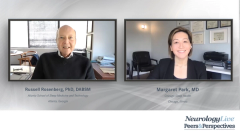
Future Directions for the Management of Narcolepsy
Margaret Park, MD, and Russell Rosenberg, PhD, DABSM, provide clinical pearls and the future treatment landscape for the management of narcolepsy.v
Episodes in this series

Russell Rosenberg, PhD, DABSM: Most physicians in primary care and family medicine aren’t keen on managing these medicines. They’re not as skilled as someone like yourself. Do you have any pearls for them? Do you recommend that everyone with narcolepsy be treated or seen by a sleep specialist? What other ideas do you have about this as take-home messages?
Margaret Park, MD: We have really smart primary care doctors out there. If they don’t know a lot about narcolepsy or they’re not familiar with the medications, they’re capable of becoming familiar with it. Usually 1 person walks in and is on a bunch of medicines, and then they become familiar with it. It’s new for them, but they learn very quickly. I have quite a few primary care doctors who are willing to take over management. I’m a sleep specialist, so this is a very biased opinion: seeing a sleep doctor regularly is a good idea. Even if the primary care doctor likes to manage the medications and see patients more regularly, which I very much appreciate, they still need things like hypertension checks, diabetes checks, weight checks, and cholesterol checks. All of that needs to be in line. Regular visits with your primary care doctor are a very good thing but checking in with a sleep specialist on a semiregular basis is a good idea to make sure that the management continues to be smooth, the medications are working as expected, and that no other sleep disorders are popping up.
I wish narcolepsy made you immune to other sleep disorders, but it doesn’t. You can still have anything in that ICSD [International Classification of Sleep Disorders] book if you have narcolepsy. I recommend screening for common things like sleep apnea, restless legs, periodic limb movements, parasomnia disorders, and weirdly enough insomnia. You can have insomnia in patients with narcolepsy. People think you can’t, but you can. That still needs to be routinely checked to make sure the balance of the 2 systems is working because you don’t have a natural balance in there. You’re not pharmacologically manipulating them or reigning them in behaviorally. As long as that system stays the same, that’s OK. But if something becomes imbalanced, we’ve got to figure out why.
Russell Rosenberg, PhD, DABSM: That’s great advice. Are you optimistic about future interventions and pharmacologic treatments for narcolepsy?
Margaret Park, MD: Oh, for sure. It’s fun to be in the field right now. We’re mapping out—sleep and wake are redundant systems, which is a good thing. I don’t want to fall into a coma every time I hit my head. The redundancy of the system means that it’s complex and there’s overlapping things and we know that sleep influences everything else, medically and behaviorally. We know intuitively that if you get a good night’s sleep, you’re more prone to be not only alert but happy. You can take physical insults a little more, and you can concentrate a little more. There are overlapping arenas within pain control, inflammatory and immunological control, memory consolidation, metabolism. As we elucidate these pathways, we’ll see the influence of sleep and wake systems and how they influence these other overlapping arenas. Specifically, for narcolepsy, it will help us develop other methods to control these 2 systems that have become destabilized from the disorder. It’s a very cool thing to be a sleep specialist right now. It’s exciting to be within the realm of sleep. Absolutely, 100%. I’m looking forward to it.
Russell Rosenberg, PhD, DABSM: I’m a sleep researcher, and we have a number of things in the clinic that are underway and clinical trials. We’ll see some additional advances in the next 5 years.
Margaret, thanks so much for talking to me. This was fun. I enjoyed our conversation. I’m sure that those who listened to what you’ve had to say will understand narcolepsy better and know what to do about it and how to treat those patients with a little more understanding.
Thank you for watching this Neurology Live® Case-Based Peers & Perspectives®. If you enjoyed the content, please subscribe to our e-newsletters to receive upcoming Peers & Perspectives® and other great content right in your in-box.
Transcript Edited for Clarity
Newsletter
Keep your finger on the pulse of neurology—subscribe to NeurologyLive for expert interviews, new data, and breakthrough treatment updates.









